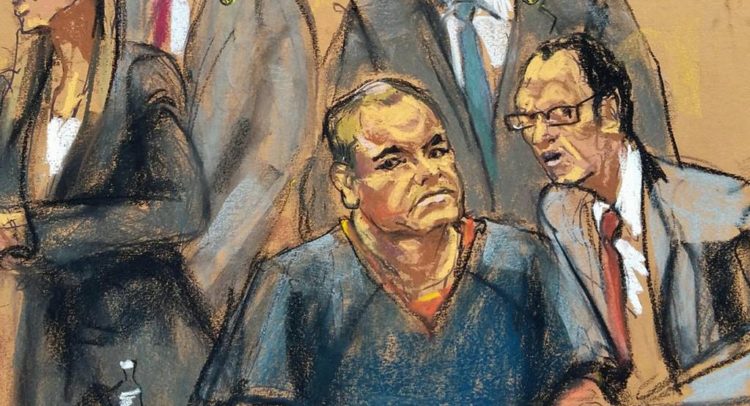BROOKLYN, NY — Prosecutors have called Joaquín Archivaldo Guzmán Loera, better known as “El Chapo,” the most notorious drug trafficker in the world. His trial, which began in earnest with opening arguments Tuesday, promises to be an affair worthy of that description.
The government successfully resisted a bid from Guzmán, 61, to even have a brief embrace with his wife before prosecutors begin making their case — fearful of the intentions of a man who is said to have run a drug cartel from behind bars and is accused of ordering the murder of those who stood in his way.
Guzmán has been held in solitary confinement in one of New York City’s most fearsome prisons — the frosted glass in his cell giving him light but no view of the outside world. Jurors in his trial will be escorted to and from the courthouse in Brooklyn by U.S. Marshals each day — their identities, like some witnesses in the case, kept secret out of fear they could face retaliation.
There is reason to worry. Guzmán has twice escaped from Mexican prisons, and prosecutors say that even behind bars he has been able to connect with an extensive support network.
In 2001, he escaped in a laundry cart with help from prison officials he had corrupted, prosecutors have said. In 2015, he did so again — making his way through a tunnel that workers had dug directly into the shower in his cell from an abandoned home more than a mile away.
Guzmán was recaptured in 2016, after a meeting with actor Sean Penn helped lead authorities to his hiding spot near the coast in northwestern Mexico. He made one last bid for freedom — scrambling down a sewer and stealing a car — but he was stopped on the highway and taken into custody. In early 2017, Mexican authorities sent him to the United States — where he had been charged over the years in multiple federal courts. Authorities decided he would face trial in Brooklyn.
Guzmán’s trial, prosecutors have said, could last as long as four months, essentially tracing his rise from a teen who grew marijuana and poppies for heroin production to a ruthless drug lord who carried a gold-plated AK-47 and a gold- and diamond-encrusted handgun. He is charged in a 17-count indictment that alleges he ran a criminal enterprise that imported and distributed massive amounts of drugs into the United States.
If convicted, he faces a mandatory minimum sentence of life in prison. Prosecutors are also seeking forfeiture of more than $14 billion.
Guzmán has pleaded not guilty, and his attorneys have waged an aggressive pretrial battle in the case.
Prosecutors have said they have dozens of witnesses who had face-to-face encounters with Guzmán, including a local law enforcement officer he bribed and others who can detail specific killings they carried out under his orders.
One witness, prosecutors have said in court filings, will describe how Guzmán used a house with plastic sheets over the walls and a floor drain that was meant to dispose of blood. Prosecutors also have said they have drug ledgers from cartel bosses and suppliers, as well as recorded conversations in which Guzmán discusses drug transactions.










